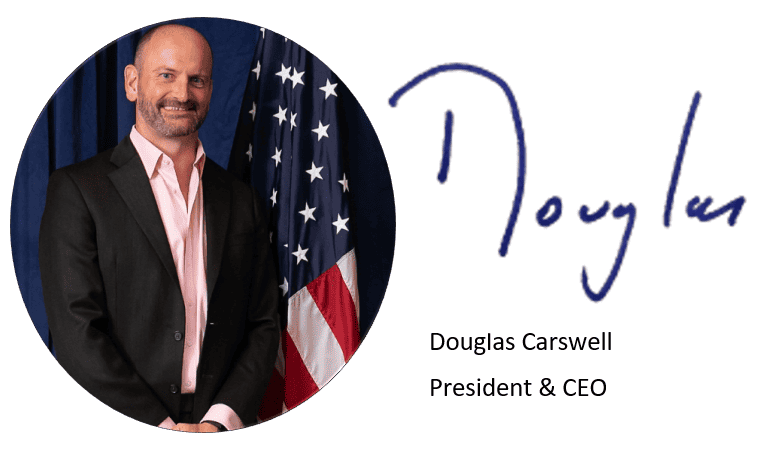The Mississippi Center for Public Policy staff attended the Neshoba County fair this week.
While there, MCPP networked with several elected officials and other policy groups, as well as celebrated some of our state's wins throughout this year, such as the historic income tax cut.

Mississippi has had a conservative super-majority for about a decade. What do we have to show for it?
To be fair, income taxes have been cut. Last year saw a universal occupational licensing law, making it easier for people to move to our state. Mississippi passed a law to combat Critical Race theory. Nor should we forget that our state managed to avoid the sort of draconian lockdowns we saw elsewhere.
These are important accomplishments, but like many in Mississippi, I can’t help thinking that conservatives in our state ought to be able to do so much more.
Our state still ranks 50th out of 50 by many measures. We do not just need bold ideas to change this. Conservatives need to do a much better job of working together to achieve common goals. This is why we have started the Mississippi Leadership Academy.
The Leadership Academy aims to encourage the next generation of leaders in our state. We will introduce them to some of the significant public policy challenges our state faces, as well as to some key institutions and individuals that impact public policy in our state.
Our carefully designed six-step program will give young leaders the skills and knowledge they will need to be agents of change.
Participants in the program will meet many of our state leaders. They will spend time learning about the legislative process in Jackson and look at how laws are made. We want those that take part in the program to appreciate how a lack of economic liberty has been holding back our state.
I am delighted that we have a great lineup of participants, who will contribute to the program. These include State Auditor, Shad White, Chip Pickering, several nationally recognized thought leaders and leading academics.
The program will be run out of our offices in Jackson and begin in October, and the application process had just opened via our website. Those that are accepted will be expected to commit to spending one day per month on the course.
The liberty movement in Mississippi could be a far more effective force for change. We could try cutting the tax burden to make us competitive compared to Tennessee and Texas. Instead of expanding the size of the state bureaucracy, we could cut it by shutting down many of those boards and commissions that clutter up Downtown Jackson.
If federal handouts made a state wealthy, ours would be the richest state in the Union. Rather than looking for more federal funding, we could have lighter regulations to stimulate growth.
If West Virginia and Arizona can introduce school choice, why can’t we?
The rising generation of leaders in our state needs to mobilize and push for real change.
I am confident that those that graduate from the program will have had a first-class introduction to the public policy process in our state. They will also have the opportunity to build a network of contacts among current and future leaders within our state.
If you are interested in applying – or if you know of any young Mississippians that have an interest in public policy and the future of our state - please do apply right away.
Applications for the Mississippi Leadership Academy 2022-23 program can be found on our website at mspolicy.org/leadership-academy
Since moving across the Atlantic to run the Mississippi Center for Public Policy, I have led successful campaigns to:
• Cut the state income tax, resulting in both the largest tax cut in Mississippi history and a flat tax.
• Enact a law to combat Critical Race theory consistent with liberty.
• Reform occupational licensing, making it easier for skilled people to work here.
Low tax, liberty max – this is what real conservatism looks like. If only folk back in Britain were offered real conservatism!
In recognition of our success in building a mass movement that made these wins possible, the Mississippi Center for Public Policy has been nominated for an award – but we need your support to win.
Please vote to make sure Mississippi wins!
Thank you!
(Jackson, MS): The Mississippi Center for Public Policy’s success in helping push through the largest tax cut in Mississippi history has been recognized nationally.
The State Policy Network today shortlisted the Mississippi Center for Public Policy, together with Empower Mississippi, for an Outstanding Policy Achievement Award for their work in securing the passage of the Mississippi Tax Freedom Act 2022.
Thanks to the Tax Freedom Act:
- $525 million was returned to Mississippi taxpayers.
- Over a million income taxpayers in our state are better off.
- Mississippi will have the fifth lowest marginal income tax rate among states that have an income tax, and one of the lowest top marginal income tax rates in the southeast.
The Mississippi Center for Public Policy was additionally shortlisted for a national Communications Excellence award for building a mass movement that made change possible. Almost 90,000 individual Mississippians read our weekly newsletter each month and thousands watch and listen to our audio-visual output.
The public will now vote to decide if Mississippi will win the Communications Award.
"We face strong competition from some of the larger states” explained Douglas Carswell, MCPP CEO & President. “We really need Mississippians to vote online to make sure that Mississippi wins!"
Please vote to make sure Mississippi wins!
Here is the URL to vote: https://spn.org/2022-communications-award-vote/
"I am over the moon that we have been recognized nationally for both our policy work and for creating a mass movement for change!" said Carswell.
"Mississippi has historically had a high tax burden, and as recently as 2021 not even a majority of Republican lawmakers in the Senate favored the change,” he explained.
"We saw an opportunity in bringing many of the key policymakers in our state together and creating a coalition for change," Carswell said. "We published rigorous research and launched a campaign to popularize the case for change. As a consequence, the Mississippi Tax Freedom Act did not just pass in the legislature where it had previously died. It passed with bipartisan support."Further details about both award nominations can be found here:
- Policy Award: https://spn.org/blog/2022-bob-williams-award-finalists/
- Communications Award: https://spn.org/blog/2022-communications-award-finalists/
Douglas Carswell joins the Governor, Speaker Gunn and others at the signing into law of the Mississippi Tax Freedom Act.
Oxford Rotary Club hosted a lunch meeting with Douglas Carswell, President & CEO of the Mississippi Center for Public Policy on Tuesday.
A former Member of the British Parliament, Carswell talked about American exceptionalism – and why respect for the US Constitution was so important.
The Mississippi Center for Public Policy announced the launch of the Mississippi Leadership Academy today.
The Mississippi Leadership Academy is a six-step program designed to equip college student leaders with the skills and knowledge necessary to be effective change agents within the state. The program will run out of the MCPP offices, conveniently located in the capital city, beginning in fall 2022 and ending in May 2023.
The Leadership Academy is a way to inform, educate and connect the rising generation of Mississippians to the free market and the realm of policymaking. It will introduce participants to some of the key institutions and individuals that impact public policy in the state, as well as gain experience and see real-world government action.
“Mississippi needs change if we are to stop being 50th out of 50,” MCPP CEO & President Douglas Carswell said. “Our Leadership Academy aims to help us achieve policy change by supporting future leaders for our state. We have put together an exciting program that introduces participants to the key challenges we face.”
Students can apply for the academy through the MCPP website at mspolicy.org/leadership-academy.
We have an impressive lineup of speakers for the program, including State Auditor Shad White, Chip Pickering and several leading academics, opinion formers and policy experts.
Upon graduation, students will have made connections with student peers, as well as our state’s preeminent thought leaders, and will graduate from the program better prepared to defend American principles, enter the workforce and lead. Aside from learning about policymaking in our state, a key aspect of the program is to encourage and inspire young Mississippians to stay, live and work in the Magnolia State.
“Mississippi has had a conservative super majority for a number of years,” Carswell said. “The Leadership Academy aims to foster a shared sense of mission and purpose as to how we might use the majority to deliver real change.”

For media inquiries, please reach out to Tyler B. Jones, [email protected].
The U.S. Supreme Court just finished its term, and the left could not be angrier. Gun rights were upheld when the Court ruled that the government does not get to decide why people can carry guns, religious freedom endured when the Court ruled that a coach has the right to privately pray on the football field, and the ability to protect the right to life was returned to the states when Roe v. Wade was overturned.
Now, House Democrats have introduced legislation to expand the Court to create a liberal majority. Congresswoman Alexandria Ocasio-Cortez called the Supreme Court “illegitimate.” The call is growing louder to completely abolish the Supreme Court in its entirety. As also shown by the push to abolish the electoral college and the Senate filibuster, when the left does not get its way, its solution is to change the rules to ensure that they do next time.
However, there is a way to be pro-abortion and anti-Roe or anti-gun but agree with the Court’s pro-second amendment ruling. In fact, some of the justices of the Supreme Court might have just given the states the green light to enact laws with which they personally do not agree. All opinions on abortion, guns, prayer, or any other political issue are irrelevant in deciding a case. What matters is constitutionality.
Is Mississippi’s abortion ban after 15 weeks constitutional? The Supreme Court ruled that it is in part because the Constitution never mentions abortion. It ruled that New York’s gun law, which required that gun owners prove their reasoning for owning guns, was unconstitutional in part because the Constitution clearly enumerates and protects the right to keep and bear arms. The same can be said about prayer.
Article I of the Constitution gives the legislature the ability to make laws. Because the left cannot sell the public on their radical ideas, they rely on unelected jurists to carry out their agenda for them. That is how the three liberal justices routinely rule. However, Article III of the Constitution lays out clearly that the Supreme Court is meant to interpret the law, not make the law. As then-Judge Amy Coney Barrett said, “It’s never appropriate for a judge to impose that judge’s personal convictions, whether they derive from faith or anywhere else, on the law.”
Along with the federal government, the scope of the Supreme Court has grown too big. It issues national decrees, barring states from making their own laws based on inferred rights found nowhere in the Constitution, such as abortion. In Marbury v. Madison, Chief Justice John Marshall ruled that the Court has the power to strike down unconstitutional laws, which is called judicial review. This power, when used correctly, safeguards states’ and citizens’ rights from a tyrannical government. When misused, however, it bypasses people and their votes to create de facto legislation. Thankfully, the Court is just now beginning to undue faulty precedent and return power to elected lawmakers and localities.
If you disagree with a law that does not specifically contradict the Constitution, do not depend on the Supreme Court to make it go away. Instead, vote for whomever most closely reflects your values to the legislative branch of government, the ones who make the law.
(Jackson, MS): The Mississippi Center for Public Policy has hired Michelle Brodsky as its new Investigative Researcher/Journalist
Michelle Brodsky, a native of Pennsylvania, will serve as the Mississippi Center for Public Policy’s new Investigative Researcher/Journalist. Through this position, she will conduct primary research on energy policy, healthcare and education and works with the Director of Communications to assemble her findings in a cohesive and succinct manner.
Michelle is a graduate of the University of Hartford where she studied history, psychology, and economics, launching her journey in conservative politics. She will be attending Cornell Law School this coming fall and hopes to eventually become a criminal defense attorney or a civil rights attorney.
“Michelle is a first-class writer who will produce in-depth research and analysis," CEO & President Douglas Carswell said. "I am excited to have her as part of our team, taking on the cozy cartels that hold our state back and advancing the cause of liberty.”
Monday was Michelle’s first day on the job. She will primarily be working virtually. Her first research article, published Thursday, can be found here.
As a first-generation American whose parents escaped the communism of the former USSR, Michelle is particularly passionate about ensuring that the United States does not end up like the former Soviet Union. Along with freedom of speech and gun rights, Michelle's top issues are school choice, education reform and election integrity.
“I am really excited to work for MCPP as an investigative reporter because I will have the opportunity to conduct primary research on issues that deeply affect all Mississippians and Americans,” Brodsky said. “In a world that relies on sound bites, it has become increasingly important to dive into the facts and draw original conclusions.”

When running for President in 2020, then-candidate Joe Biden promised to “defeat the NRA” by banning assault weapons and enacting other radical gun control measures. After recent mass shootings in Buffalo, New York, and Uvalde, Texas, President Biden signed gun control legislation into law, but did he deliver on his campaign promises?
The latest ‘red flag’ law being debated in Washington increases mental health funding, closes the so-called “boyfriend loophole,” which aims to prevent unmarried domestic abusers from acquiring guns, and most controversially, incentivizes states to adopt “red flag laws.”
Red flag laws allow citizens to go to court to seek an order permitting law enforcement to seize the weapons of a person who has exhibited behavior indicating they might be a threat to themselves or others. Conservatives, wary of big government abuse and overreach, say red flag laws could be used to target people over political beliefs. For example, someone’s leftist ex-girlfriend could pursue a court order against them for posting a picture with guns or sharing a “dangerous” opinion on social media, and if one judge deems it appropriate, those guns could be taken away for some period of time.
Yes, this new law is another step in the left’s march toward stronger gun control laws, but it does not ban assault weapons or deliver any other major progressive “wins” that President Biden promised. Biden admitted this himself, saying that “this bill doesn’t do everything I want.” Other members of the President’s parties have made even more extreme gun control promises than Biden. Texas Governor Candidate Beto O’Rourke, who has lost two elections within the last four years, famously said “hell, yes” in response to whether certain guns should be taken away by law-abiding gun owners. New York Governor Kathy Hochul said that she is prepared to enact gun control so extreme that her state will “go back to muskets.”
Democrats control both chambers of Congress and the presidency, but they still cannot deliver on their anti-second amendment crusade. As their political capital diminishes, their promises become increasingly vague, from an assault weapon ban to “common sense gun reform” to simply “doing something.” This catch-all phrase is designed to create the façade that something truly special has happened thanks to the President’s leadership when, in reality, that is nowhere near the truth.
Meanwhile, the Supreme Court has struck down a New York law that required citizens to show “proper cause” to get a concealed carry gun license. According to the left, the right to bear arms is dependent on if the anti-gun government thinks the specific reasoning for doing so is good enough. Thankfully, the Supreme Court can recognize an unconstitutional infringement when it sees one. For the past thirty years or more, the anti-gun lobby has promised a lot. But they don’t have an awful lot to show for it.




